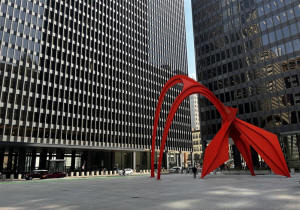2 former ComEd CEOs – only one on trial – take stand in bribery case
 Send a link to a friend
Send a link to a friend
[April 15, 2023]
By HANNAH MEISEL
Capitol News Illinois
hmeisel@capitolnewsillinois.com
 CHICAGO – Former Commonwealth Edison CEO Anne Pramaggiore has spent the
last five weeks sitting in a federal courtroom in Chicago, sandwiched
between her attorneys at the defense table. CHICAGO – Former Commonwealth Edison CEO Anne Pramaggiore has spent the
last five weeks sitting in a federal courtroom in Chicago, sandwiched
between her attorneys at the defense table.
She’s listened to prosecutors build their case against her and three
former lobbyists for the utility, all of whom stand accused of
orchestrating a yearslong bribery scheme in order to curry favor with
Illinois House Speaker Michael Madigan. According to federal
prosecutors, the four granted jobs and contracts to Madigan allies in
exchange for an easier path for ComEd-backed legislation in Springfield.
On Thursday afternoon, Pramaggiore began what’s expected to be a lengthy
and grueling period on the witness stand, attempting to cast a new light
on the dozens of wiretapped recordings and hundreds of emails the jury
has heard and seen. A defendant testifying in court is rare – and risky.
After facing her own attorneys, Pramaggiore will submit to
cross-examination from prosecutors.
In her first 50 minutes on the stand Thursday, attorney Scott Lassar
gave Pramaggiore the chance to tell the jury that she couldn’t have been
bribing Madigan; she didn’t even think that was possible given his
“skeptical” take on ComEd and utilities in general.

“Did you view Speaker Madigan as a friend or an ally of ComEd?” Lassar
asked.
Pramaggiore firmly replied, “no.”
“Did that ever change?” Lassar followed up.
“No.”
Sitting with impeccable posture wearing a black dress and matching
blazer, Pramaggiore recounted her path from an Ohio kid whose obsession
with the 1968 Olympics led to her dominating in the quirky sport of race
walking – “not what you want to do when you’re a 12-year-old girl” – to
one of the top executives in Chicago. Along the way, she was a theatre
major, a department store inventory buyer and an antitrust lawyer.
Pramaggiore said she got “crickets” from an audience of 300 ComEd
linemen, customer service representatives and underground operators
during a town hall meeting she held at one of the utility’s three dozen
offices on her first day as the utility’s chief operating officer.
She said she’d learned from a book on former U.S. Secretary of State
Colin Powell’s leadership style that not hearing feedback from
subordinates meant they don’t trust their leader.
So Pramaggiore said she challenged the silence, asking why “things are
going so poorly” if “everything’s perfect here.”
“Our linemen let me have it,” she said, recalling an outpouring of
complaints on dozens of topics, starting with the dysfunctional state of
ComEd’s trucks at the time.
Pramaggiore also said she prioritized fixing the historically “very
poor” relationship ComEd had with the unions representing the utility’s
workers. She spent time visiting ComEd’s offices and substations all
over Chicagoland, listened to customer service calls and went out with
ComEd workers during storms to understand how the utility repaired power
outages.

All of those data points Pramaggiore would use to develop a plan to “fix
a system that had been degraded, not properly invested in” and “was
really in terrible shape.”
Witnesses throughout the trial have testified to Pramaggiore’s hard work
and attention to detail, although she sought to share credit for her
successes at ComEd while on the witness stand.
Pramaggiore heaped praise on codefendant Mike McClain, a longtime
contract lobbyist for ComEd who was also one of Madigan’s closest
confidants. He and the former speaker face related racketeering charges
in a trial set for next year.
“I was the first woman to run (one of the utilities within) Exelon and I
think I was the last,” Pramaggiore said of her “challenging move” into
the role of ComEd CEO in 2012.
She said she “wasn’t really a fit” for the male-dominated, “hard-party(ing)”
and “ferociously competitive” culture around her, so she “leaned on Mike
McClain quite a bit” and described him as a friend and trusted advisor.
“(He’s a) good student of humans and human behavior,” Pramaggiore said.
“He was also a good tactician…He was a smart lawyer. He understood our
regulatory issues, which are complicated.”
McClain was also a valued lobbyist to ComEd, not just for his
understanding of the utility’s issues but also for his longtime and
close friendship with Madigan. But Pramaggiore said that even with that
relationship, McClain never relayed to ComEd what the speaker was
thinking about the utility’s legislative priorities.
Instead, she said, McClain advised ComEd executives to focus on the
strategy of coalition building within constituencies important to
leaders in Springfield: organized labor, environmental groups, the
business community and the Black and Latino caucuses within the General
Assembly. The object was to make it so those leaders “kinda got forced
to call a bill.”

[to top of second column]
|

The Dirksen Federal Courthouse is
pictured in Chicago. (Capitol News Illinois photo by Hannah Meisel)

“He had relationships that were beyond just Speaker Madigan,”
Pramaggiore said of McClain. “He knew probably more legislators than
probably our top 20 lobbyists put together.”
By contrast, Pramaggiore downplayed her relationship with Madigan, which
prosecutors had portrayed as chummy.
The two had gotten to know each other a bit during a trip to Turkey in
2010 sponsored by a nonprofit. McClain and his wife were also among the
dozen or so travelers, along with both Pramaggiore’s then-teen son and
Madigan’s son Andrew.
On the trip, Pramaggiore learned one of Madigan’s most notorious
qualities.
“He’s a very quiet person, doesn’t say a lot,” she said, describing
their ensuing relationship as strictly professional, never social, and
“somewhat remote.”
After the fundraisers ComEd would hold for Madigan and the Democratic
Party of Illinois every couple of years, Pramaggiore noted that at
dinner, the speaker would be flanked by the top two executives at
Exelon, while “I would usually be down on the kids side of the table.”
Pramaggiore’s testimony was preceded by a trio of character witnesses on
her behalf, who described her as having “the utmost integrity.”
But before those witnesses, Pramaggiore’s legal team called her
successor as ComEd CEO, Joe Dominguez, to the witness stand. Dominguez
is now based in Baltimore and serves as president and CEO of
Constellation Energy, the energy generation company that was spun off
from Exelon last year.
Dominguez had been subpoenaed for his testimony, which was at times
combative, especially with Assistant U.S. Attorney Amarjeet Bhachu.

In 2020, the feds announced ComEd would pay a $200 million fine stemming
from a deferred prosecution agreement connected to the alleged bribery
scheme. But the jury doesn’t know that, as Judge Harry Leinenweber
blocked that from being part of any testimony in the case.
Dominguez himself has not been charged but did sit for two “proffer”
sessions in the fall of 2019, often the first steps of getting someone
to cooperate as a witness in a criminal investigation.
On Thursday, Dominguez objected to Bhachu’s characterization of his
tacit approval of several Madigan allies who had for years been getting
paid $4,000 to $5,000 monthly as subcontractors of ComEd’s contract
lobbyists. The men did little to no work, prosecutors allege.
Bhachu accused Dominguez of not being totally forthcoming with
prosecutors in their September 2019 proffer session when he was
questioned about the subcontractors, noting that Dominguez never
mentioned a conversation that had been secretly videotaped by the feds’
cooperating witness, former ComEd executive Fidel Marquez.
In that March 2019 meeting between Marquez, Dominguez and McClain,
McClain explained to Dominguez that ComEd had for decades been used as
an entity that powerful politicians could place loyalists in
good-paying, stable jobs.
“It’s the old-fashioned patronage system,” McClain explained. “And ComEd
played it like a – “
“Like a chip,” Dominguez said, finishing McClain’s sentence.
Dominguez said he didn’t recall that conversation when the feds
interviewed him six months later, or in a follow-up interview a few
weeks after that.

On Thursday, Bhachu said the feds played Dominguez the tape of that
meeting during his second interview with the feds in the fall of 2019,
but he said Dominguez neglected to tell the agents his response to
Marquez a few weeks later: “There’s stuff I want to understand and stuff
I don’t need to understand.”
Dominguez grew annoyed with Bhachu’s line of questioning and accused the
prosecutor of taking his words out of context.
“As you full well know, I went on to tell Mr. Marquez that ‘Everything
we do here needs to be on the up and up,’” Dominguez said.
Dominguez then attempted to tell the court what Bhachu allegedly told
him during that September 2019 proffer meeting, but Bhachu quickly cut
him off.
“If you’re going to start talking about what I said, you might want to
not do that because it might not work out well for you,” Bhachu said
before telling Judge Leinenweber that Dominguez was out of line in
bringing up their conversation. “What I said is inadmissible.”
The dust-up elicited accusations from the defense attorneys that Bhachu
was threatening a witness.
The trial continues at 10 a.m. on Monday.
Capitol News Illinois is a nonprofit, nonpartisan news
service covering state government. It is distributed to more than 400
newspapers statewide, as well as hundreds of radio and TV stations. It
is funded primarily by the Illinois Press Foundation and the Robert R.
McCormick Foundation. |